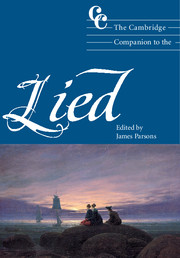Book contents
- Frontmatter
- Part I Introducing a genre
- Part II The birth and early history of a genre in the Age of Enlightenment
- 2 The eighteenth-century Lied
- 3 The Lieder of Carl Philipp Emanuel Bach, Haydn, Mozart, and Beethoven
- Part III The nineteenth century: issues of style and development
- Part IV Into the twentieth century
- Part V Reception and performance
- Index
2 - The eighteenth-century Lied
from Part II - The birth and early history of a genre in the Age of Enlightenment
Published online by Cambridge University Press: 28 September 2011
- Frontmatter
- Part I Introducing a genre
- Part II The birth and early history of a genre in the Age of Enlightenment
- 2 The eighteenth-century Lied
- 3 The Lieder of Carl Philipp Emanuel Bach, Haydn, Mozart, and Beethoven
- Part III The nineteenth century: issues of style and development
- Part IV Into the twentieth century
- Part V Reception and performance
- Index
Summary
“The noble simplicity of song”
Song is such an inborn, seemingly straightforward inclination that it is easy to forget it sometimes has engendered controversy. This especially is the case if the subject is the eighteenth-century Lied. That this is so is something of an anomaly, for the very qualities praised during the genre's heyday are what latter-day critics have most decried: tuneful preeminence, diatonic clarity, strophic design, unaffected simplicity, and directness of appeal. Charles Rosen, a writer who lately has done much to advance understanding of Classical and Romantic music, dispenses with the Lied before Schubert in no uncertain terms: “a despised form, unfit for serious consideration.” The opinion is by no means exceptional. Edward T. Cone, who has written with discernment on Schubert's Lieder, describes those from the century before as so many “tuneful trifles.” For Lawrence Kramer, the achievement of Schubert's predecessors adversely compares with his unrivalled success. “In Schubert's hands the German Lied became the first fully developed genre of Romanticism in music” in contrast to the “anemic chords and arpeggios” filling out the songs of a Reichardt or Zelter. Nor is Kramer the first to suggest that Schubert had to vanquish the lyric efforts of his forerunners. As Eric Sams states in the 1980 New Grove Dictionary of Music and Musicians, Schubert's song facility was “practically without ancestry.” Rosen makes the point even more emphatically. After Schubert's “first tentative experiments, the principles on which most of his songs are written are almost entirely new; they are related to the Lieder of the past only by negation: they annihilate all that precedes.”
- Type
- Chapter
- Information
- The Cambridge Companion to the Lied , pp. 33 - 62Publisher: Cambridge University PressPrint publication year: 2004
- 27
- Cited by



